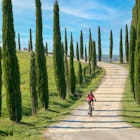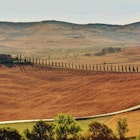
Florence in 5 Shops: Tuscan leather, hand-painted ceramics and sculpture souvenirs

Feb 21, 2024 ⢠4 min read

Florence is a city that celebrates its craftspeople © Angelo Zinna
Florence's transformation over the past two decades may not be visible at first glance â the red roofs, stone-paved alleys and Renaissance monuments have remained largely intact for centuries.
But ask anyone who lives in the Tuscan capital and theyâll tell you about the consequences of turning an entire city into an open-air museum. Millions reach the UNESCO-inscribed city center each year and small-scale businesses formerly catering to locals increasingly adapt to attract the flowing masses.
Moving back to the city after 12 years abroad has made this shift even more evident to me. As I walk through the streets of Florence, I often wonder where the balance between urban spaces meant to be lived and spaces designed to be visited lies. But despite the pressures of the modern world, a number of independent artists, designers, craftspeople and winemakers continue to feed old traditions and contemporary culture with new ideas. You just need to find them.

Best for souvenirs: Galleria Romanelli
Steps away from the 14th-century city gate of Porta San Frediano, pays tribute to the ancient art of transforming marble and clay into realistic figures. The Romanelli family has operated in this former church since the early 19th century when Pasquale Romanelli began his craft under the mentorship of Lorenzo Bartolini. Bartolini, whose works are displayed in the Galleria dellâAccademia and other prestigious museums, passed away in 1850, and Romanelli took over the studio. This marked the beginning for six generations of artists who have continued to work there to the present day. Upon entering the gallery's glass doors, visitors find themselves amidst monumental statues of historic figures and animals in the spectacular showroom. For a unique memento, join one of the classes led by Raffaello Romanelli to create your own clay section of Michelangeloâs David.

Best for local design: Apelle Lab
Florence's relationship with leather production spans more than 800 years. In 1282, the Arte dei Cuoiai e Galigai, a guild of professional tanners and leather artisans, was established in the city, marking the beginning of a tradition that persists to this day. Venture beyond the crowded stalls of San Lorenzoâs market and into an underground workshop on Via dei Pandolfini for a contemporary twist on the ancient craft.
A mannequin adorned with nipple covers sets the tone when you walk into , opened in 2023 by Ilaria and Guglielmo, alumni of Florenceâs renowned Scuola del Cuoio. The workshop functions as both a coworking space for independent leather artisans and a studio that produces belts, shoes, glasses cases, and wall decorations from upcycled materials sourced from production leftovers. Choose from the distinctive pieces on display or participate in a three-hour hands-on session to craft your own belt.

Best for crafts: Bottega Pendolare
After a two-year stint in Madrid mastering the art of pottery making, Viola returned to her native Florence to open her ceramics studio in 2021. Set in the vaulted rooms of a former bicycle shop in Via degli Alfani, draws inspiration from historic Florentine workshops while bringing a contemporary, international flair to the cityâs artisan community. Imagine sipping tea from a horned mug or watching a pointy nose emerge from your soup as you empty your bowl â the colorful âFreaksâ collection, exhibited on the mismatched shelves of Bottega Pendolare, promises to add a touch of tongue-in-cheek humor (and some actual clay tongues) to your kitchen. Courses are available on request.

Best for books: LâOrnitorinco: Literature and Neighborhood Culture Hub
The rapidly gentrifying San Frediano neighborhood was long devoid of an independent bookstore until Lilith opened , meaning "platypus," in 2021. Since its inception, this shop, situated in a former butchery on the tranquil Via di Camaldoli, which links Piazza Tasso with Piazza de' Nerli, has evolved into the area's cultural hub. Browse through a curated selection of translated Italian fiction and non-fiction, graphic novels and artists' prints, or ask Lilith for a recommendation. Stop by in the morning, when you can combine your literary exploration with an espresso in the shop cafe's relaxing atmosphere, then return in the evening to experience one of the frequent slam poetry nights, readings and events hosted on the bookstoreâs stage.

Best for food/wine: Enoteca Fratelli Zanobini
Wine has been a cornerstone of Florentine culture since the Middle Ages, when vinattieri (wine producers and merchants) began selling wine from what would later be recognized as the Chianti region, extending south of Florence to Siena. Many historic enotecas (wine shops) can still be found in the historic center, with in the bustling San Lorenzo district being a local favorite. On warm spring and summer evenings, people gather on the sidewalk in front of this wine store, enjoying glasses of pre-dinner vino from San Cascianoâs Le Lame winery, which is owned by the same family that operates the shop. The shelves inside boast hundreds of Tuscan wine labels waiting to be taken home. Don't hesitate to ask for a recommendation and sample Chianti Classico on the spot while choosing your preferred bottle.
Explore related stories



 Road TripsThe 11 best day trips from Rome from medieval villages to ancient wonders
Road TripsThe 11 best day trips from Rome from medieval villages to ancient wondersOct 17, 2024 ⢠10 min read
 Cultural SiteTuscan road trip: a flexible itinerary across the region's highlights
Cultural SiteTuscan road trip: a flexible itinerary across the region's highlightsSep 30, 2024 ⢠4 min read




 Local VoicesItaly vs Croatia: which Mediterranean country is right for you?
Local VoicesItaly vs Croatia: which Mediterranean country is right for you?Jun 13, 2024 ⢠8 min read
